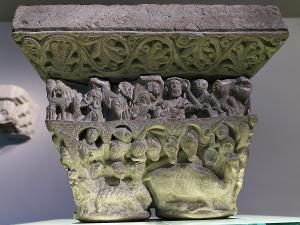 In what has turned out to be the first installment of this Holy Week excursion through my personal faith journey, as accompanied by the book of Job, I discussed two findings I made after my initial confrontations with the biblical book nearly 50 years ago. Those two insights were: 1) the God revealed in the book is a vastly complex deity, mysterious yet present, creator of all things yet not easily dropped into any simple boxes, truly a God to be held in awe but also one present and available; 2) that God is far more interested in honest questioning than in simplistic and over-certain reverence. God listens and responds to Job’s often outlandish and blasphemous ranting, but pays little heed to the pious and unquestioned beliefs of the friends of Job. Indeed, God speaks only one sentence to one of the friends! The theology of those friends is tossed aside by that God as inadequate and finally useless as an explanation both of God and the functioning of the universe. Job and we learn that the God of the cosmos is far more than and far different from some mechanical being who automatically rewards the righteous and punishes the wicked. To engage with that God is to enter the struggle for truth and hope and justice, but a justice that is deeply complex and based on God’s perceptions rather than our own human-devised sense of what is right in the universe. Each of these themes deserves far more explication than I can provide in one brief essay, but I hope they energized you to think more deeply about them as you search for the wells of your own trip toward faith.
In what has turned out to be the first installment of this Holy Week excursion through my personal faith journey, as accompanied by the book of Job, I discussed two findings I made after my initial confrontations with the biblical book nearly 50 years ago. Those two insights were: 1) the God revealed in the book is a vastly complex deity, mysterious yet present, creator of all things yet not easily dropped into any simple boxes, truly a God to be held in awe but also one present and available; 2) that God is far more interested in honest questioning than in simplistic and over-certain reverence. God listens and responds to Job’s often outlandish and blasphemous ranting, but pays little heed to the pious and unquestioned beliefs of the friends of Job. Indeed, God speaks only one sentence to one of the friends! The theology of those friends is tossed aside by that God as inadequate and finally useless as an explanation both of God and the functioning of the universe. Job and we learn that the God of the cosmos is far more than and far different from some mechanical being who automatically rewards the righteous and punishes the wicked. To engage with that God is to enter the struggle for truth and hope and justice, but a justice that is deeply complex and based on God’s perceptions rather than our own human-devised sense of what is right in the universe. Each of these themes deserves far more explication than I can provide in one brief essay, but I hope they energized you to think more deeply about them as you search for the wells of your own trip toward faith.
In today’s reflection I want to add two more lessons toward enlivening my faith journey, both of which I have encountered over the years since my first look at Job. The first insight has to do with what I learned from the book concerning the task of preaching, the details of which you may find in my 1999 book, “Preaching Job.” Job taught me just how serious the work of preaching must be if it is to have any real impact during a time when the church’s influence on society has waned considerably. If we preachers are to become rather more than Job’s friends, secure in our certainties, comfortable in our retread nostrums, “miserable comforters,” as Job names his “friends,” we must take more seriously both the demands of a God who has given us minds with which to think and hearts with which to love all of God’s creation. The question of Job becomes not merely an exercise in philosophical debate, a game of verbal sword crossing, but rather a demand for a decision concerning just who our God is and a refusal to be satisfied with an easy response to that most serious question. God offers an earnest reply to the question as the deity sweeps onto the scene of the angry confrontation between Job and friends, telling all four (or five if one includes the upstart Elihu) of them and us that the issue to be addressed is not limited to who is right in the cosmos, who may be easily discerned as just and righteous, but rather just what kind of God it is who created and sustains that cosmos. Job spends the bulk of the dialogue defending his righteousness, his integrity, imagining, along with the friends, that God simply must reward his piety and not destroy him as he thinks he is experiencing God’s uncalled for anger against him. The speech of YHWH, among many other things, announces to Job and the friends that their discussion has been based on thoroughly false premises; the God they have been using as the foundation of their arguments against one another plainly does not exist, and YHWH goes about demonstrating that fact in the presentation of the realities of the universe that God puts on display.
And that wonderful display of wind and weather and wild creatures offers still another insight I have gleaned toward my expanding notion of faith. YHWH’s closing speech in the book is a fantastic announcement of the necessity of Job, the friends, and us to take with the utmost seriousness the central cosmic concern of our time, namely the necessary attention to our threatened environment, that stark reality that is nothing less than the most important and most universal problem that all face, human, animal, and plant. This earth is the only planet we have, and in more ways than we might care to name, that one earth is suffering through exploitation of its limited resources, through the inordinate and inexorable heating of its surface, and through the unequal ways that these threats are being distributed across the globe. The poor of the earth are enduring the dangerous offscourings of the rich of the earth, the exploitation of the wealthy nations is being felt most keenly among those who have far less. Nevertheless, all of us, and our animal and plant companions, are currently and will be in the future impacted profoundly by this warming planet.
Job raises for me the proper way to respond to the potential ecological disaster that we all face, and YHWH provides a delightful and fruitful reply in that powerful speech at the end of the book. Let me focus on a part of that speech by way of example. In Job 39:9-12 God challenges Job to admit that he does not have any command over the animals that God has created. Job spends the dialogue demanding that God reward him as the obviously righteous man that he is, and in response God challenges him to demonstrate that he has any sort of control or dominion over any of earth’s creatures. This may seem at first glance an odd reply to Job’s demand for divine justice, but it does in truth respond by saying that Job’s passionate contentions for his personal justice are in the face of the larger concerns of God’s cosmos not the correct question to raise. The more basic question is: who controls and thus claims to dominate the earth? Genesis 1:26-28 has given to us that dreadful claim that we humans are to be “rulers” over the fish, birds, and land animals; indeed we are to “subdue” them. Job 38 makes sport of such claims.
“Is the wild ox willing to serve you? Will he spend the night beside your crib?
The answer to these rhetorical questions is: “hardly!” Job, you cannot claim mastery over any part of the creation of God. Later in the same chapter, YHWH shows us that the animals themselves laugh heartily at our attempts at control of their behavior. The wild ass “laughs at the uproar in the city,” (Job 39:7), the ostrich “laughs at horse and rider” as it runs by them with its majestic speed (Job 39:18), and the charging horse “laughs at dread” (Job 39:22). YHWH shows Job the voices of the wild creatures that challenge with great humor the so-called mandate that humans claim to justify their “dominion” over them. God’s universe is wild and free, and given to laughter in the face of our puny attempts at mastery over it. Indeed, our attempts at mastery have led us not to ease and comfort, but to the horrors of environmental collapse and planetary suffering.
In YHWH’s speech of Job 38-42 there reside many more resources for a robust environmental ethic that all must now wrestle with energetically and continuously. All that concern I have now learned from Job, though of course the author of Job had no notion of imminent ecological disaster. Still, his deep concern for God’s earth in its many manifestations has provided for us moderns important insights with which we can face the very real disasters of our planet’s increasing pain.
In these two additional ways then, the book of Job has directed my faith search in ways that I did not discern as I set out on the trip: the desperate need for the most serious preaching and the necessary turn toward the environment as a key component of any modern Christian faith Job has given to me. I am once again in that ancient author’s debt. I urge you to read Job again. In its pages you may discover new ways to form and shape your own journey of faith.
(Images from Wikimedia Commons)











